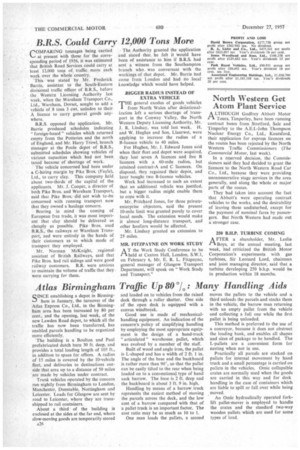B.R.S. Could Carry
Page 28

If you've noticed an error in this article please click here to report it so we can fix it.
COMPARING tonnages being carried
at present with those for the corresponding period of 1956, it was estimated that British Road Services could carry at least 12,000 tons of traffic more each week over the Whole country.
This was stated by Mr. Frederick Barrie, assistant to the South-Eastern divisional traffic officer of B.R.S., before the Western Licensing Authority last week, when the Wareham Transport Co., Ltd., Wareham, Dorset, sought to add a vehicle of 8 tons 3 cwt. unladen to their A licence to carry general goods anywhere.
B.R.S. opposed the application. Mr. Barrie produced schedules indicating " foreign-based" vehicles which returned empty from the Potteries and the north of England, and Mr. Harry Trowl, branch manager at the Poole depot of B.R.S., submitted schedules showing vehicles of various capacities which had not been taxed because of shortage of work.
The vehicle concerned had been under a C-hiring margin by Pike Bros. (Fayle), Ltd., to carry clay. This company held about two-thirds of the capital of the applicants. Mr. J. Cooper, a director of both Pike Bros. and Wareham Transport, said that Pike Bros. did not wish to be concerned with running transport now that they owned a haulage concern.
Bearing in mind the coming of European free trade, it was most important that clay should be delivered as cheaply as possible. Pike Bros. used B.R.S., the railways or Wareham Transport, and were entirely in the hands of their customers as to which mode of transport they employed.
Mr. Norman McKnight, regional assistant of British Railways, said that Pike Bros. had rail sidings and were good railway customers. B.R. were anxious to maintain the volume of traffic that they were carrying for them.




















































































